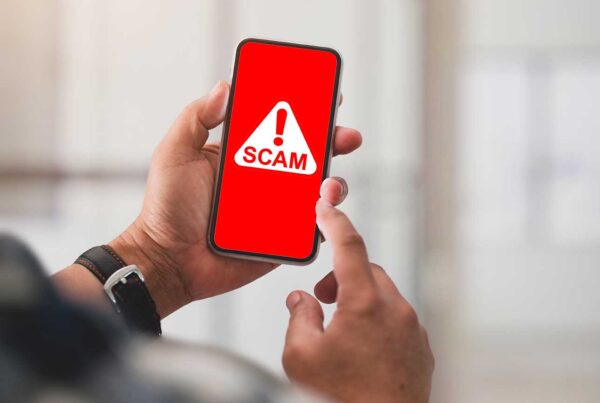Scammers are expert manipulators. They initiate believable correspondence with potential victims and then play on their emotions to gain access to their personal information or finances.
The good news is this: Almost all scams contain the same basic blueprint, no matter the form the communication takes. If you learn to recognize the red flags, you can avoid being scammed.
Here are the four red flags to look for:
- Pretense. To establish credibility despite cold calling or messaging, scammers pretend to be trustworthy sources such as a friend or acquaintance, a business you’re vaguely aware of, your financial institution, or a government entity.
- Problem or Prize. Scammers reach out to you with a problem that makes your heart race and your emotions run high. It could be that your child or grandchild is in trouble, your account has been hacked, or they represent an organization and are requesting your support for a worthy cause. They might even claim that you won a prize.
- Pressure. Once your emotions are sufficiently engaged, scammers create urgency so that you don’t have time to think before you act. “This is urgent!” “Act now!” “This issue requires immediate action.”
- Payment. Scammers try to obtain your personal/financial information and/or money.
If you find yourself on the receiving end of any correspondence that contains any of these red flags, do not engage, do not share any personal or financial information, and do not send money. End the correspondence. Block the sender and delete it. A good rule of thumb? Be immensely skeptical of any/all unsolicited communications.
These are four common scams we’re seeing in 2024. Let’s practice spotting the red flags.
Romance Scams: The Out-of-State Partner
It starts with an out-of-state connection on an online dating site or social media. Over a short period, the scammer builds a relationship with you, exchanging photos and romantic messages. You might even talk on the phone or through a webcam. When enough trust is built into the relationship, the scammer requests that you share the login credentials of your bank account with them. Or they’ll ask you directly to send money. Maybe they have a health issue or a family emergency they can’t cover. Or they wish they could visit you if only they could afford it. After they get access to your money and take it, they’re gone.
Red Flags: You never meet in person, and they ask for money or account information.
Phone Call: Impersonating Government Officials
You receive a phone call from someone claiming to be with a government agency like the Federal Trade Commition, Social Security Administration, Internal Revenue Service, or Medicare. To make it seem legitimate, the scammer may even give you their “employee ID number.” They have information about you—your name, your address, and other basics they can track down online. Then they’ll explain that you need to make a payment or are receiving a refund. If you can share your personal banking information, why, they can take of that right now for you.
Red Flags: This one hits them all. Unsolicited call from a credible source. Problem (missed payment) or prize (refund). Urgency (take care of this now). Request for online banking information.
Phone Call: “You won the Publisher’s Clearing House Sweepstakes!”
You pick up the phone and a joyful voice congratulates you: “You are the lucky winner of the $5 Million Publishers Clearing House Sweepstakes! To claim your winnings, wire us $2,500 to cover taxes and processing fees, and we’ll send you a check for the full amount within five business days. Are you ready to take down the transfer details, or do you need 24 hours to free up some funds?”
Red Flags: Unsolicited call. Prize ($5 million. Lucky you!). Request for money in order to receive your prize.
Snail Mail: Fake U.S. Treasury Checks
You receive a check in the mail from the U.S. Treasury. The accompanying letter explains that you are entitled to the enclosed government grant, tax refund, etc. All you need to do is deposit the check and wire a portion of the funds back to cover taxes and processing fees.
Red Flags: Unsolicited communication. Prize (grant, refund, etc.). Request for money (send portion of funds back to cover taxes and processing fees).
We said it once, but we’ll say it again:
If you find yourself on the receiving end of any correspondence that contains any of these red flags, do not engage, do not share any personal or financial information, and do not send money. End the correspondence. Block the sender and delete it. A good rule of thumb? Be immensely skeptical of any/all unsolicited communications.
How Verve and Fraud Squad can help
Our Fraud Squad provides education around common scams to retailers and consumers within the Fox Valley and surrounding areas. The program helps raise awareness of common scams so they can more easily recognize the lies and avoid phone, email, social media, gift card and other scams to help them protect their financial health and wealth.
If you think your Verve account is at risk because of any scam, call Verve at 800.448.9228. One of our team members can look at your account with you to verify there are no suspicious transactions, help you cancel your card if you’ve entered your number into a questionable website, and help you safeguard your account against fraud.
It’s Verve’s goal to provide education, training, and information to help our members stay financially fit. Verve is committed to keeping our members educated when it comes to their finances by providing details on financial risks and ways to stay safe.
Want to learn more? Check out these additional blogs.





 Federally Insured by NCUA |
Federally Insured by NCUA |  Equal Housing Opportunity |
Equal Housing Opportunity |